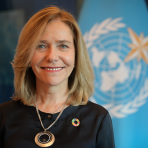Statement on the occasion of the World Day for Glaciers & World Water Day 2025 Celebration
Glaciers are precious water sources, sustaining livelihoods of billions of people and supporting key sectors such as agriculture, industry, and clean energy. Yet, they are disappearing at an alarming rate due to climate change.
In 2023, glaciers lost over 600 gigatons of water, marking the highest mass loss recorded in the past five decades of record-keeping. For the second consecutive year, all glaciated regions in the world reported ice loss.
Glaciers play a crucial role in the global water cycle, regulating seasonal water availability. If temperatures continue to rise, their hydrological contribution will diminish, leading to significant disruptions in water supplies. By the end of the century, glacier runoff is projected to decline substantially, threatening ecosystems, economies, and our collective future.
Every fraction of a degree of warming therefore matters. Urgent action is needed to slow glacier loss and mitigate the far-reaching consequences of climate change.
This year’s World Water Day aligns with the International Year of Glaciers’ Preservation 2025, co-coordinated by WMO and UNESCO. This initiative aims to raise global awareness of glaciers' vital role, promote concrete action, enhance scientific research, and strengthen policy frameworks and financial support for glacier preservation.
The World Meteorological Organization (WMO) has elevated the cryosphere—glaciers, snow, ice sheets, permafrost, and sea ice— to one of its top priorities, advocating for stronger international collaboration in monitoring and understanding changes in snow and ice in all forms.
Programs such as the Global Cryosphere Watch and the WMO Integrated Processing and Prediction System are crucial in providing the data and information necessary for effective climate action. Good decisions and effective policies need to be evidence based, and WMO is working with Members and partners to enhance monitoring, data exchange, and cooperation.
Strengthening these areas will enable better water resource management and early warning systems for glacier-related hazards, helping communities adapt to changing water availability and increasing climate risks.
Preserving glaciers requires stabilizing the climate and this is not just an environmental issue—it is a survival strategy.
Statement by


